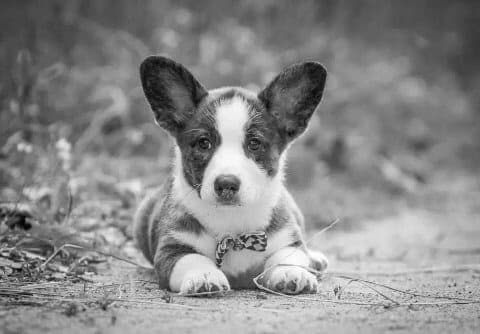
Conformation Judging of the Cardigan Welsh Corgi
Discover the art of judging Cardigan Welsh Corgis, focusing on their unique conformation, hallmark front, and balanced structure.
Home » Meet The Breeds » Cardigan Welsh Corgi
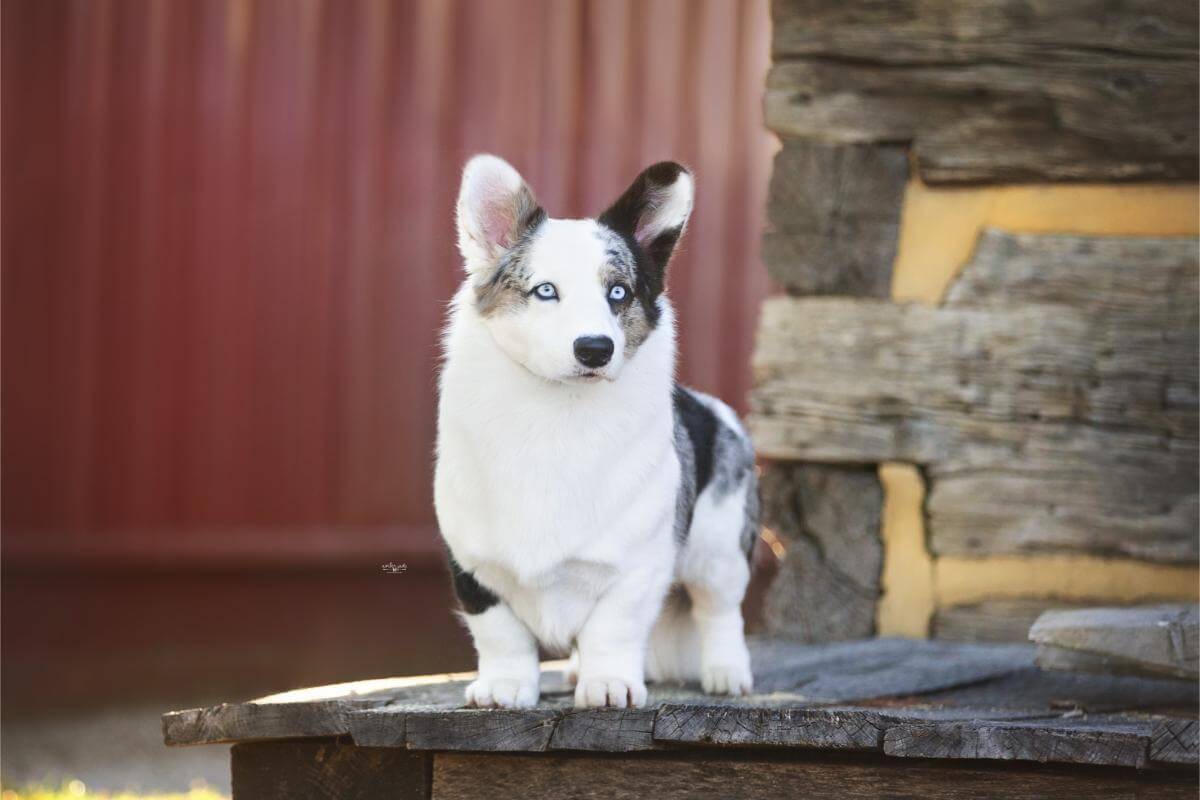

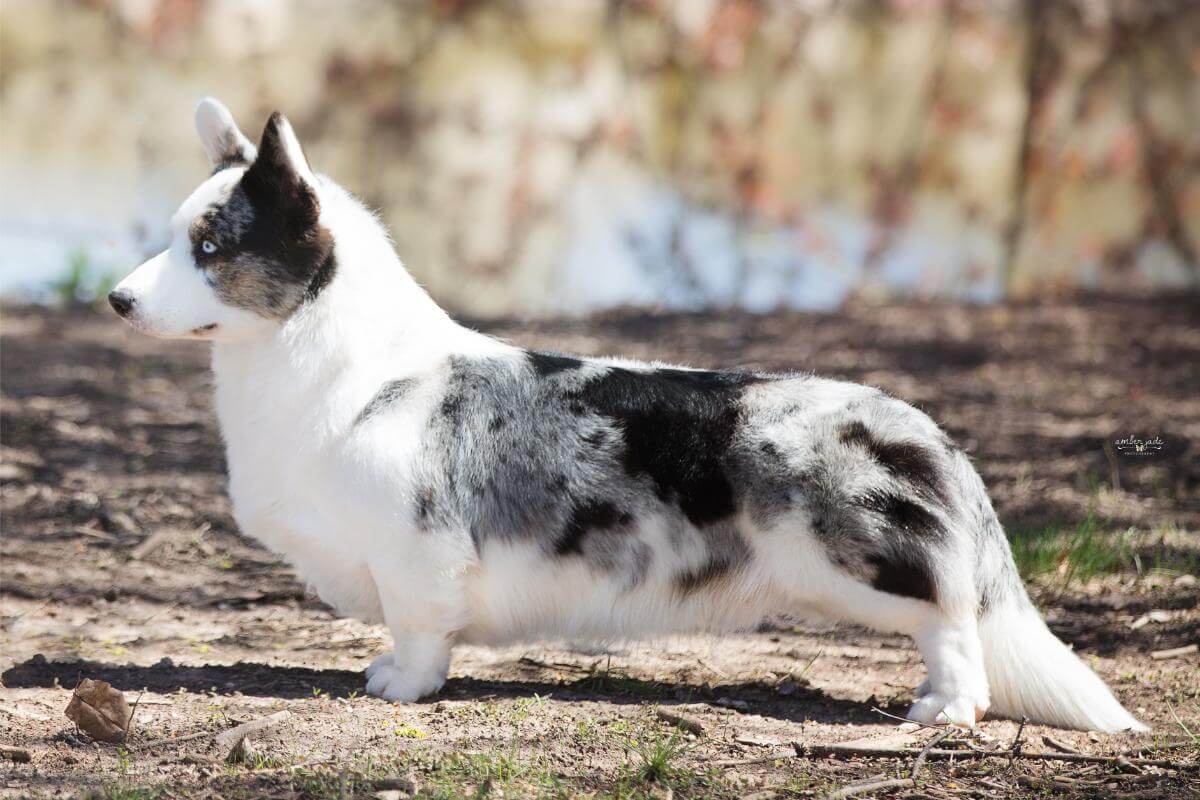
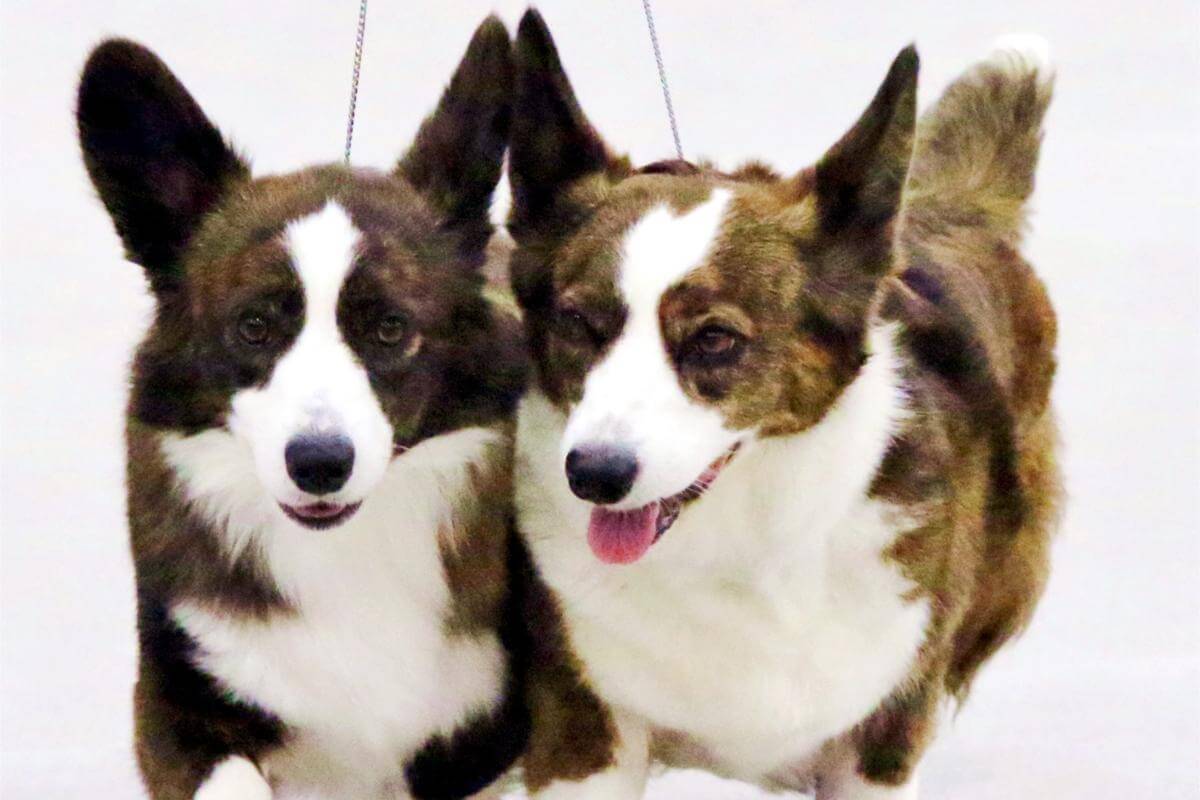
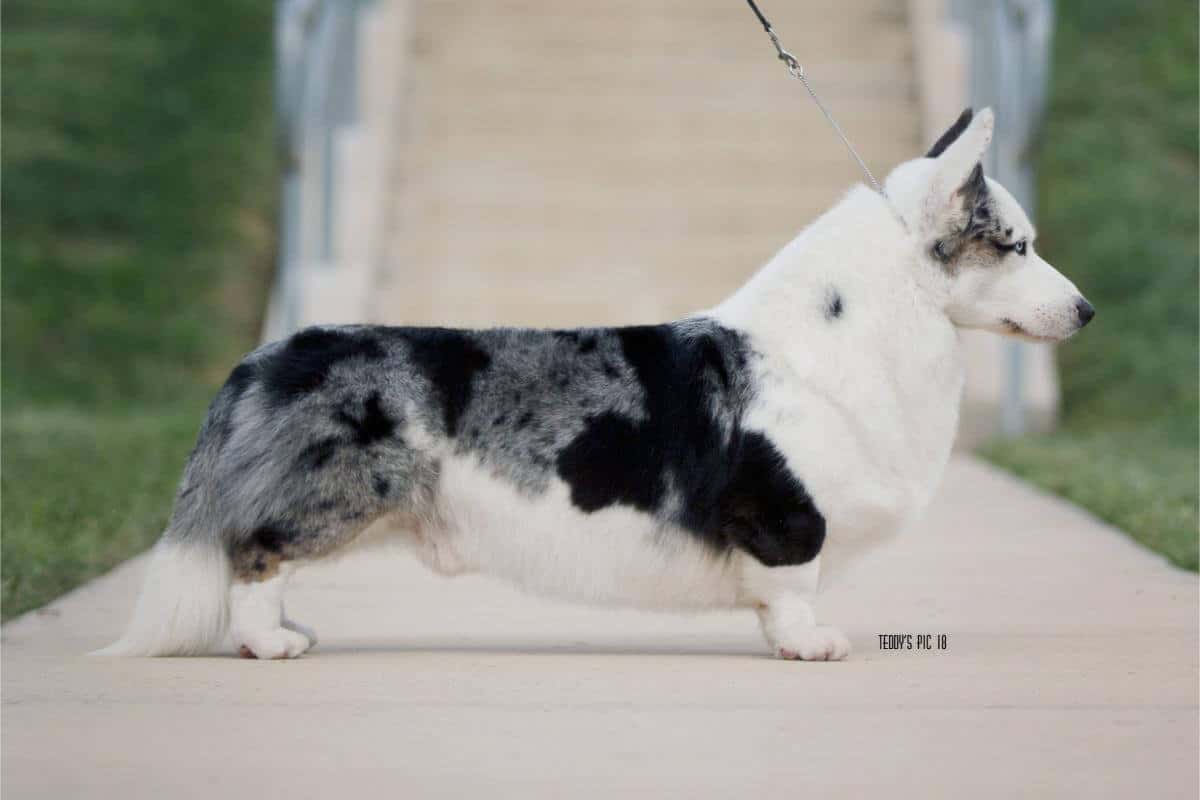
The Cardigan Welsh Corgi is one of the most cherished dog breeds of the British Isles. Recognizable by its robust stature and distinctive tail, this Corgi is deeply rooted in the history and traditions of Wales. Not merely a pastoral dog, the Cardigan, as he is often called, has won the hearts of many, transcending its farm dog origins to become a beloved companion in homes around the world.
Herding
10.5 – 12.5 inches
25 – 38 pounds
12 – 15 years
| Country of Origin | Wales |
|---|---|
| Bred For | Herding, Watchdog, Companionship |
| Known For | Trainability, Sensibility, Affection |
| Popularity | Moderate |
| Temperament | Loyal, Smart, Affectionate |
| Activities | Herding, Hiking, Conformation Shows, Dog Sports |
The Cardigan Welsh Corgi boasts a rich heritage that stretches back to the beautiful terrain of its native Wales in the United Kingdom. As one of the oldest herding breeds, its story spans well over a thousand years.
Delving into its past, it is believed that the ancestors of the Cardigan were introduced to Wales by Celtic tribes during their migration around 1200 BC. Over subsequent years, the dogs were meticulously bred for their stellar herding abilities, gradually shaping the breed that is seen today.
Historically, the Cardigan was an invaluable partner to Welsh farmers. The dogs primarily used to herd cattle. The dogs’ compact stature proved advantageous, letting them adeptly nip at the heels of cows and quickly sidestep any retaliatory kicks. Their agility, coupled with their sharp intellect, made them an irreplaceable presence on the farm.
It’s intriguing to note that while both the Cardigan and its cousin, the Pembroke Welsh Corgi, have intertwined histories and similar pastoral roles, they stand as distinct breeds. Originating from separate regions of Wales, they exhibit variations in size, appearance, and even temperament. A notable difference is the presence of a tail in the Cardigan, contrasting the traditionally tail-less Pembroke.
By the early 20th century, the Cardigan Welsh Corgi had captivated the hearts of many, leading to its official recognition by major kennel clubs and registries. The American Kennel Club embraced the breed in 1935, with The Royal Kennel Club in the UK and the Fédération Cynologique Internationale also offering their respective support.
From its humble beginnings as a diligent farm dog, the Cardigan Welsh Corgi has seamlessly transitioned into a cherished household companion across the globe. The breed’s captivating charm, melded with a history steeped in tradition, has guaranteed the its sustained allure.
Mature Cardigan Welsh Corgis typically stand at a height of 10.5 to 12.5 inches at the shoulder.
In terms of weight, males usually range between 30 and 38 pounds, with females slightly lighter, weighing from 25 to 34 pounds. These measurements will likely vary based on the individual dog’s genetics and care, but they provide a general framework for the breed.
The overall balance of the Cardigan Welsh Corgi is crucial to its appearance. The breed boasts a body that is longer than the dog’s height, giving the breed a distinctive, elongated profile. This length is accentuated by the breed’s level topline and strong spine, essential traits for its historical work as a cattle drover. Substance-wise, the Cardigan is robust and solid, embodying a perfect balance between muscular strength and agility. This blend allows this long and low dog to move with speed and precision, characteristics that have made it a reliable herder for generations.
Texture: The Cardigan Welsh Corgi sports a double coat that provides protection against the elements. The outer coat is dense and of medium length, with a texture that is slightly harsh to the touch. Underneath, there’s a soft, insulating undercoat that helps the Cardigan adapt to various weather conditions. The combination makes the coat effective in repelling water and shielding the dog from both cold and heat. The correct coat sports “pants” on the back of the rear legs; however, coats that are flat, skimpy, soft, silky, curly, wiry, long or fluffy are unacceptable in the breed, as they do not offer protection from the elements.
| Standard Color | |
|---|---|
| Black & White | ee |
| Blue Merle & White | ee |
| Brindle & White | ee |
| Red & White | ee |
| Sable & White | ee |
| Brindle Merle & White | ee |
| Gray & White | ee |
| Liver & White | ee |
| Red Merle & White | ee |
| Sable Merle & White | ee |
| White Merle | ee |
A Note About Color: The coat may be all shades of red, sable, brindle, black, and blue merle, with or without tan or brindle points. White is acceptable on the muzzle, neck, chest, legs, underparts, and tip of tail. White may also appear as a blaze on the head, but it should never be the predominant color nor should it surround the eyes, and it may appear as a small spot or splash on the body.
| Standard Marking | |
|---|---|
| Black Mask | ee |
| Black Mask & Ticked | ee |
| Brindle Points | ee |
| Brindle Points & Ticked | ee |
| Tan Points | ee |
| Tan Points & Ticked | ee |
| Ticked | no |
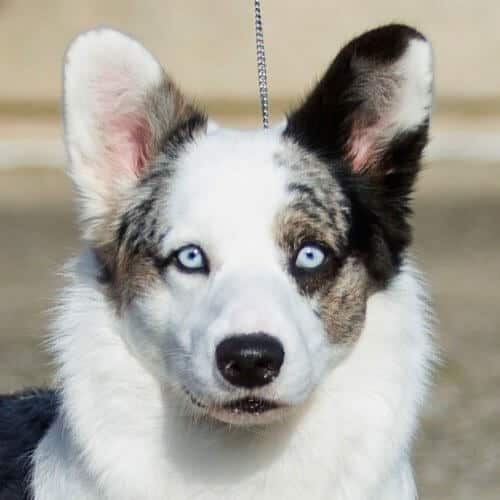
The tail of the Cardigan Welsh Corgi significantly distinguishes it from its close relative, the Pembroke Welsh Corgi. Historically speaking, the Cardigan’s tail tells the story of its pastoral background and offers a silhouette that is cherished by breed aficionados.
When relaxed, the Cardigan’s tail extends in length and is in line with the body, resting in a low position. However, the tail may shift to a higher elevation when the dog is particularly alert or moving. It doesn’t curl over the back, however, and should maintain a straight profile. The dense coat covering the tail sometimes appears bushier than that of the rest of the body, imparting a feathery or plume-like appearance. This not only enhances the tail’s appearance, it also provides protection when the Corgi navigates through tall grasses or over uneven terrain.
The natural, undocked tail is a noteworthy characteristic of the Cardigan Welsh Corgi. The long tail is a defining breed hallmark that is deeply rooted in the breed’s service as a drover and cattle dog. Beyond its aesthetic value, the tail contributes to the dog’s balance and its agility to act as a rudder.
When contemplating the addition of a Cardigan Welsh Corgi to the household, several factors should be taken into account. This breed, with its deep-rooted history as a herder, possesses a blend of intelligence, alertness, and affection that makes it an engaging companion. However, its heritage also means that it comes with particular needs and characteristics that prospective owners should be aware of to ensure a harmonious relationship.
The Cardigan Welsh Corgi is generally a robust and hardy dog, owing to its working dog lineage. These dogs often display good health throughout their live, but like all dogs, they can have specific health concerns that potential owners should be aware of.
Lifespan: On average, a Cardigan can expect to live between 12 and 15 years if given proper care, a balance diet, and regular veterinary check-ups. This lifespan can vary based on individual health, genetics, and overall care, but it does provide a general measure of the breed’s longevity.
The Cardigan Welsh Corgi, like all breeds and mixed breeds, can be predisposed to certain health conditions. Being aware of the risks can aid owners in taking preventive measures and spotting early signs of discomfort or illness, thus ensuring timely medical attention.
It is always best to acquire a Cardigan Welsh Corgi from a responsible breeder who knows the medical history of the dog’s parents. Regular veterinary exams are essential for monitoring a Cardigan’s health too, and it is essential to maintain a relationship with a vet who is familiar with the breed’s specific needs. Routine screenings, especially as the dog ages, can help to detect any potential issues early on.
The Cardigan Welsh Corgi is a breed replete with personality and spirit, making it a beloved choice for families, individuals, and seniors alike. Yet, understanding its temperament and inherent traits is essential to bring about a compatible and harmonious relationship.
For those new to dog ownership, the Cardigan can be both a joy and a challenge. The breed’s intelligence and eagerness to please make it relatively adaptable to various households. Still, its herding instincts can sometimes manifest in ways that a novice owner might find surprising, like nipping at heels or trying to “herd” children and other pets.
Sensitivity is another key aspect of the Cardigan’s disposition. These dogs tend to be deeply attuned to their owners’ moods and emotions, often acting as barometers for the household’s general sentiment. This sensitivity, combined with a herding dog’s intelligence, makes this breed particularly responsive to positive reinforcement and gentle correction.
While the Cardigan is naturally sociable and forms strong bonds with its family, it can be reserved or even suspicious of strangers. Early socialization can help to mitigate excessive wariness and ensure that the dog remains well-mannered around guests.
When it comes to other dogs, the Cardigan typically gets along well, especially if introduced properly and early in life. The breed’s herding instincts, however, might make these dogs more assertive or dominant, especially around dogs of the same sex.
As for young children, the Cardigan Welsh Corgi’s generally affectionate and protective nature shines. Nevertheless, due to those herding tendencies, it’s crucial to supervise interactions to prevent unintended (mis)behaviors.
The Cardigan Welsh Corgi’s energetic nature and sturdy build demand a well-balanced diet to support its overall health and vitality. Understanding the dietary needs of the Cardigan, from puppyhood through to adulthood, is crucial for its long-term well-being.
As puppies, Cardigan Welsh Corgis have a higher metabolic rate, and thus, require more frequent feedings to support their growth. It’s advisable to feed a Cardigan puppy a high-quality dog food specially formulated for puppies, which will provide the necessary nutrients to foster healthy bone and muscle development. Typically, puppies would start with three to four meals a day, gradually reducing as they approach adulthood.
Transitioning to adulthood, a Cardigan’s dietary needs change. Adult dogs typically thrive on two meals a day. The amount of food will vary depending on factors such as the dog’s age, weight, activity level, and overall health. On average, a healthy adult Cardigan Welsh Corgi may consume between 1 to 1.5 cups of high-quality dog food daily, split between two meals. It’s important to consult with a veterinarian or a breed-specific feeding chart to determine the exact portion sizes suitable for individual dogs.
Though Cardigans are known for their love of food, owners must be cautious about overfeeding. Due to their relatively compact size and long back, carrying excess weight can put undue stress on a dog’s spine and joints, making it susceptible to health issues.
Fresh water should always be readily available for the Cardigan, ensuring it stays hydrated, especially during warmer months or after bouts of vigorous activity.
When it comes to treats, these can be an excellent training aid but should only be given in moderation. Always be sure that treats are suitable for the dog’s size, overall condition, and dietary needs.
Training a Cardigan Welsh Corgi is a rewarding journey that unveils the breed’s intelligence, agility, and eagerness to please. However, these qualities, paired with the Cardigan’s innate herding instincts and independent streak, can make the training process both engaging and, at times, challenging.
The Cardigan’s intelligence is undeniable. This breed is quick to pick up new commands and often excels in obedience training. But with intelligence comes a propensity for independent thought. Cardigans may sometimes weigh the command against their current desire or distraction, deciding whether to obey immediately or test the boundaries.
Given the breed’s herding background, it’s not uncommon for a Cardigan to exhibit behaviors like nipping at heels or attempting to “manage” the movements of family members or other pets. Early training can help to channel these instincts productively and ensure that such behaviors are controlled.
It’s worth noting that Cardigans are rather vocal. Their tendency to bark can be a natural alarm system, alerting owners to anything unusual in the immediate environment. However, without proper training, this can evolve into excessive barking. With consistent instruction and positive reinforcement, it’s possible to manage and even reduce unnecessary vocalizations.
On the subject of their intellectual prowess, Cardigans score high on canine intelligence scales. This trait means that not only do they benefit from basic obedience training, they also thrive when presented with mental challenges. Puzzle toys, agility courses, and advanced obedience or trick training can be wonderful outlets for their cognitive energy.
A key aspect to remember when training a Cardigan Welsh Corgi is the power of positive reinforcement. Given the breed’s sensitive nature, these dogs respond best to rewards, praise, and gentle guidance, rather than harsh corrections. Maintaining a consistent training regimen, setting clear boundaries, and offering varied mental stimuli will ensure a well-adjusted, happy, and obedient Cardigan.
Lastly, due to the potential wanderlust of the breed, it’s essential to instill a solid recall command early on. This will ensure that even when a Cardigan’s curiosity beckons, it will return promptly when called.
The Cardigan Welsh Corgi is a lively and energetic breed, brimming with enthusiasm and a zest for life. Despite the breed’s shorter stature, these dogs have a robust and athletic nature, requiring regular exercise to maintain their mental and physical well-being.
| Energy Level | Moderate |
|---|---|
| Exercise Requirements | 1 Hour/Day (Minimum), Daily Walks, Vigorous Running, Regular Exercise, Playing with Another Dog, Mental Stimulation |
While they may appear content simply lounging indoors, it’s essential not to underestimate the Cardigan’s exercise needs. This breed thrives on activities that engage both the body and mind. Daily walks are fundamental, providing the dog with the opportunity to explore, socialize, and burn off energy. Ideally, a Cardigan should have at least 30 to 45 minutes of moderate exercise daily, which can be split between morning and evening walks.
Beyond walking, Cardigans greatly benefit from play sessions, be it fetch, tug-of-war, or interactive toys. Their natural agility and intelligence make them excellent candidates for more structured activities like Agility Trials, Herding Trials, or even Obedience competitions.
When considering their energy level, it’s evident that while they’re not as hyperactive as some working breeds, Cardigans are far from sedentary. These dogs have a moderate to high energy level, reflecting their herding ancestry. Without regular outlets for this energy, they can become restless or even develop undesirable behaviors.
In terms of intensity, while they enjoy bursts of energetic play, Cardigan Welsh Corgis are equally content with steady-paced activities that prevent them from over-exerting themselves. Their playful demeanor shines through in most activities, making exercise sessions a delightful bonding time for both dog and owner.
The Cardigan Welsh Corgi boasts a double coat that serves as a testament to its hard-working heritage. This protective layer not only provides insulation against harsh weather conditions, it also gives the breed its distinct appearance. However, with such beauty comes responsibility; proper grooming is essential to maintain the coat’s health and the overall well-being of the dog.
| Coat Type | Medium Length, Dense, Harsh, Weather-Resistant |
|---|---|
| Grooming Requirements | Daily Brushing, Occasional Bathing, Routine Ear Cleaning, Periodic Nail Trimming, Regular Tooth Brushing |
Cardigans possess a thick undercoat and a longer topcoat, which, while not particularly prone to matting, does require regular brushing. A good rule of thumb is to brush your Cardigan at least once a week to remove loose hair, prevent potential tangles, and distribute natural skin oils throughout the coat. During shedding seasons, which generally occur in the spring and fall, increasing the frequency of brushing can help to manage the larger volume of loose hair.
Despite their coat’s propensity to shed, Cardigans are considered moderate shedders. They don’t continuously shed year-round like some breeds, but when they do, it can be quite noticeable due to the thickness of the undercoat. Regular grooming sessions can drastically reduce the amount of hair found around the house.
When it comes to baths, the Cardigan doesn’t require frequent washing. In fact, overbathing can strip the coat of its natural oils, making it dry and brittle. Instead, the Cardigan needs bathing only when necessary, such as when the dog is particularly dirty or has a noticeable odor.
Other grooming essentials include regular nail trimming, as overgrown nails can cause discomfort or lead to health issues. Checking and cleaning the ears periodically is also crucial to prevent infections, as is brushing the teeth to ensure good oral hygiene.
The Cardigan Welsh Corgi, with its charismatic presence and loving nature, makes a delightful companion. However, to provide a harmonious coexistence, integrating this breed into one’s home and lifestyle requires understanding its unique needs and characteristics.
Starting with their adaptability to living spaces, Cardigans, despite their active nature, can adjust well to apartment living. Their moderate size makes them suitable for smaller homes, provided they receive their required exercise and mental stimulation. A backyard is a bonus, but not a necessity, as long as they have access to outdoor spaces for regular walks and playtime.
Weather tolerance is another aspect to consider. The Cardigan’s double coat equips it to handle cooler climates with ease. These dogs are naturally insulated against cold weather, making them comfortable and even playful in snowy conditions. However, this same thick coat can be a challenge in hotter climates. Owners should ensure that their Cardigan stays cool during peak summer months, avoiding intense midday sun, providing plenty of water, and considering indoor play or early morning and late evening walks.
The Cardigan’s inquisitive and social nature means that it will thrive when integrated into daily family activities. These herding dogs are keen observers and often wish to be involved in whatever their family is doing. Whether it’s watching TV together in the evening or accompanying the family on an outing, the Cardigan cherishes these moments of bonding.
In terms of noise and activity levels within the home, the Cardigan’s herding background means this breed might occasionally try to “herd” family members, especially younger children, by nipping at their heels. Proper training and early socialization can help to curtail this instinctual behavior. Additionally, as mentioned earlier, Cardigans can be vocal, so a household that appreciates or can manage occasional barking would be ideal.
The sight of a Cardigan Welsh Corgi puppy, with its bright eyes, floppy ears, and playful demeanor, can melt any heart. These puppies grow into loyal companions, and raising them correctly from the outset is crucial for a well-adjusted adult dog. Like all puppies, Cardigans come with their own set of unique needs and considerations during their formative months.
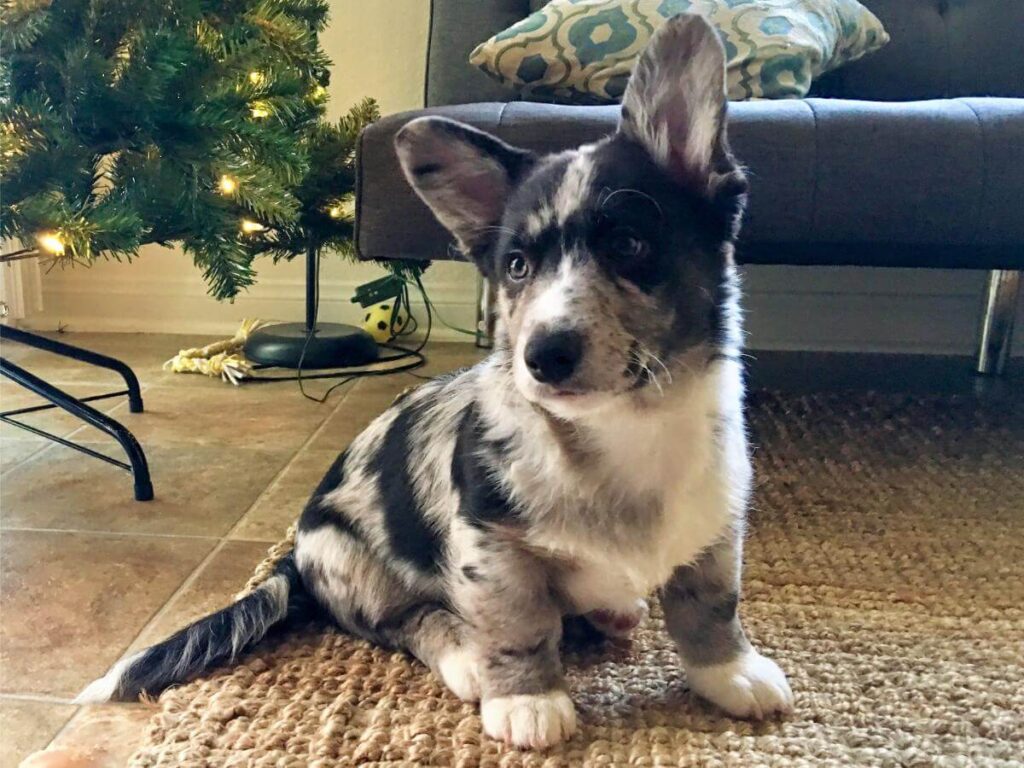
From the moment a Cardigan Welsh Corgi puppy enters a home, it embarks on a journey of learning and discovery. This period is pivotal for shaping its personality, behavior, and overall well-being.
Nutrition plays a significant role in a puppy’s growth. Providing a balanced diet that caters to the specific needs of growing Cardigans ensures they will develop strong bones, a shiny coat, and a healthy immune system. It’s always advisable to consult with a veterinarian or breeder to understand the best food options and portion sizes for Cardigan puppies.
Socialization is another cornerstone of raising a Cardigan puppy. Exposing the pup to various environments, people, animals, and experiences helps in building their confidence and reducing future anxieties or fears. Positive encounters with children, other pets, and everyday stimuli, like moving vehicles and household noises, are particularly beneficial.
Training should begin early, capitalizing on the Cardigan’s intelligence and eagerness to please. Simple commands, housebreaking, and leash training can be introduced in the initial weeks, building a foundation for more advanced training as the puppy grows. Positive reinforcement methods work best, rewarding good behavior and gently guiding the youngster away from undesirable behaviors.
Health check-ups are crucial during the puppy stage. Regular visits to the vet guarantees the puppy will receive necessary vaccinations and deworming, and an overall health assessment. Monitoring the pup’s growth, weight, and any signs of health issues can preempt potential problems.
Lastly, play and rest are vital components of a Cardigan puppy’s life. While every puppy will have bursts of energy and curiosity, ample sleep and rest are also needed to support a growing body. Providing a comfortable resting space and a variety of toys can strike a balance between activity and relaxation.
The Cardigan Welsh Corgi is not just a charming and delightful companion. This breed boasts a rich heritage of working prowess, intelligence, and adaptability. Over time, the Cardigan has proven its versatility by participating in diverse activities and dog sports, a testament to the breed’s wide range of skills.
The Cardigan Welsh Corgi is versatile and enjoys many activities. By joining them in these activities, their skills may be showcased, and both dog and handler can benefit from the physical and mental activity.
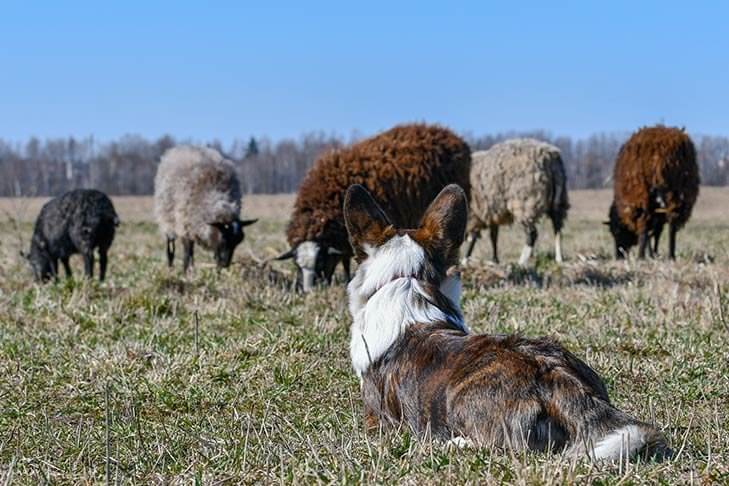
The Cardigan Welsh Corgi is recognized by the world’s leading registries and kennel organizations, which categorize the breed into a specific Group based on its unique characteristics. This breed is recognized worldwide under the following Group designations:
| Organization | Group Designation |
|---|---|
| AKC (American Kennel Club) | Herding |
| UKC (United Kennel Club) | Herding Dog |
| CKC (Canadian Kennel Club) | Herding |
| ANKC (Australian National Kennel Council) | Working |
| RKC (The Royal Kennel Club) | Pastoral |
| FCI (Fédération Cynologique Internationale) | Group 1: Sheepdogs and Cattle Dogs; Section 2: Cattle Dogs |
The ideal Cardigan Welsh Corgi is described by a Breed Standard that is approved by each of the world’s leading registries and kennel organizations. The Breed Standards for this breed may be found in the following links:
| Organization | Breed Standard |
|---|---|
| American Kennel Club | AKC Cardigan Welsh Corgi Breed Standard |
| United Kennel Club | UKC Cardigan Welsh Corgi Breed Standard |
| Canadian Kennel Club | CKC Cardigan Welsh Corgi Breed Standard |
| Australian National Kennel Council | ANKC Cardigan Welsh Corgi Breed Standard |
| The Royal Kennel Club | RKC Cardigan Welsh Corgi Breed Standard |
| Fédération Cynologique Internationale | FCI Cardigan Welsh Corgi Breed Standard |
Throughout the world, the appreciation for the Cardigan Welsh Corgi has led to the establishment of several breed-specific clubs. These organizations serve as a nexus for enthusiasts, breeders, and pet owners, aiming to promote the Breed Standards and the breed’s welfare and usefulness.
In the United States, the Cardigan Welsh Corgi Club of America stands as the primary organization dedicated to this breed. Since its inception, the club has been committed to the continuous betterment of the breed, offering resources on breed health, education, and social and competitive events.
In Canada, the Canadian Cardigan Corgi Club stands as a beacon for breed enthusiasts. Devoted to promoting the welfare, Standard, and history of the breed, this association is a hub for breeders, owners, and admirers alike. The club’s members offer a wealth of resources, from educational materials to a variety of events, ensuring the Cardigan’s legacy thrives throughout the provinces.
The United Kingdom is home to the Cardigan Welsh Corgi Association. With a deep-seated connection to the breed’s historical roots, this organization plays an integral role in preserving the Cardigan’s legacy in its homeland. Its members actively engage in hosting a series of events, shows, and educational programs which celebrate the Cardigan’s unique heritage.
Joining any of these clubs provides an avenue for Cardigan Welsh Corgi enthusiasts to connect, share experiences, and participate in many enjoyable events.
The dedication to the Cardigan Welsh Corgi extends beyond breed clubs and into the compassionate hearts of those who focus on rescue and rehoming. Rescue groups play an invaluable role in providing second chances to Cardigans that, for various reasons, find themselves without a permanent home.
In the United States, the Cardigan Welsh Corgi National Rescue Trust is at the forefront of such efforts. This organization is steadfast in its mission to ensure that every Cardigan receives the love, care, and shelter it deserves. By working closely with a network of volunteers and foster homes, the group’s volunteers rehabilitate and rehome Cardigans, providing both medical care and behavioral training when necessary.
In the United Kingdom, organizations like the Welsh Corgi Rescue Service offer refuge to both Cardigan and Pembroke Welsh Corgis in need. The organization’s dedication mirrors the global sentiment of supporting the welfare of this cherished breed.
Yes, Cardigan Welsh Corgis shed. They have a double coat that sheds throughout the year, with heavier periods of coat loss typically occurring during the spring and fall. Regular grooming can help to manage the shedding and keep the coat in top condition.
Mature Cardigan Welsh Corgis typically stand at a height of 10.5 to 12.5 inches at the shoulder. In terms of weight, males usually fall between 30 and 38 pounds, with females slightly lighter, weighing from 25 to 34 pounds.
The primary differences between Pembroke and Cardigan Welsh Corgis are the two breeds’ tails, ears, and body size. Cardigans have long, bushy tails and larger, rounded ears, whereas Pembrokes typically have a very short tail and more pointed ears. Additionally, Cardigans tend to be slightly larger and heavier than their Pembroke counterparts.
No, Cardigan Welsh Corgis are not considered hypoallergenic. They shed regularly, and their dander can trigger allergies in sensitive individuals. To be certain there is no allergic reaction, potential owners with allergies should spend time with the breed before making a commitment.
Cardigan Welsh Corgis are intelligent and eager to please, which generally makes them receptive to training. However, they also have an independent streak, so consistent, positive reinforcement methods work best. Early socialization and puppy training classes can be beneficial for this breed.
Cardigan Welsh Corgis, if properly socialized from a young age, can get along well with cats. Their herding instincts might prompt them to try and “herd” cats, but with proper introductions and supervision, many Cardigans can live harmoniously with feline companions.
While Cardigan Welsh Corgis are not as popular or widespread as their Pembroke relatives, they are not exactly rare. They have a dedicated following and are recognized by several major kennel clubs. However, they might not be as frequently encountered in some areas, making them seem less common.
Cardigan Welsh Corgis can be vocal. Bred as herding dogs, they use barking as a tool to control livestock. As a result, these dogs may bark to alert their owners of strangers and strange animals, or unusual sounds and noises. Proper training and socialization can help to alleviate excessive barking.

Discover the art of judging Cardigan Welsh Corgis, focusing on their unique conformation, hallmark front, and balanced structure.
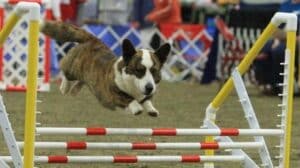
Discover the versatile Cardigan Welsh Corgi, a breed that excels in Agility, Herding, and more, while being the perfect companion at home.

Keylee Grenier, Cardigan Welsh Corgi breeder/owner-handler, shares her journey, mentors, tips, and love for NOHS and Bred-By.

Kathy Schwabe, breeder of Xtacee Cardigan Welsh Corgis, shares insights on breeding and mentoring in an interview by Allan Reznik.
Interview with Herding Group Breeder Lori Frost – I currently live in Ventura, California. I received my first dog for my second birthday, an
The best way to ensure a long and happy relationship with a purebred dog is to purchase one from a responsible breeder. Not sure where to begin?
Contact the National Parent Club’s Breeder Referral Program, which is listed on the AKC Breeder Referral Contacts page.
